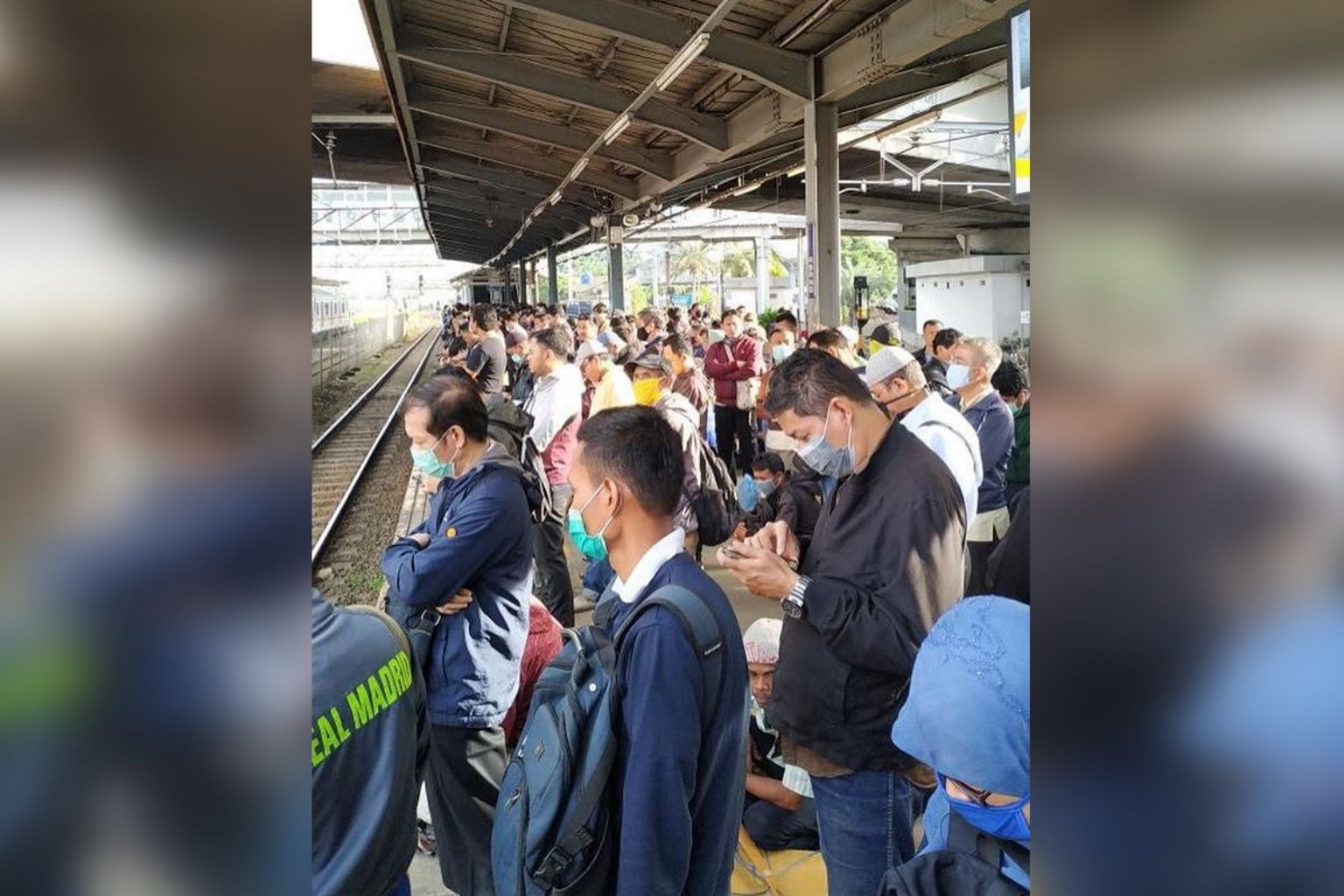Train stations in Jakarta packed on first workday of 14-day state of emergency to contain coronavirus
Sign up now: Get ST's newsletters delivered to your inbox

Instead of staggered timing, passengers were forced to squeeze into crowded trains.
PHOTO: JKTINFO/INSTAGRAM
Follow topic:
JAKARTA - Train stations in the Indonesian capital and its satellite towns were jam-packed on Monday (March 23) as confusion reigned on the first workday of the two-week state of emergency Jakarta Governor Anies Baswedan declared for the city last Friday.
Passengers were forced to squeeze into crowded trains as staggered timings did not materialise.
Operating hours for transport services such as commuter trains and buses were cut in Jakarta, which is bracing itself for a spike in Covid-19 infections.
Workers, including nurses and those in the service sector, complained on social media that the public transport chaos caused many of them to be late for work.
Pictures of crowded trains and long queues started circulating on social media from early on Monday morning.
From Monday, venues in Jakarta such as cinemas, bars, bowling alleys, spas and massage parlours will be shuttered for two weeks.
It follows the move to close schools for two weeks from March 16.
Under the state of emergency, trains are operating from 6am to 8pm. The Jakarta MRT's usual hours are 5am to midnight and the KRL Commuterline, which operates in the Greater Jakarta Area, 4am to midnight.
The cut in public transport services has made it difficult for some to get to work.
"Staff at hospitals work in three shifts and many rely on commuter train lines to go to work. So how?" Ms Ade Andryani posted on Twitter.
"Our morning shift starts at 7am and the noon shift ends at 9pm. The new operating hours are a huge burden."
"I live far from my work place," she said, adding that she normally leaves for Jakarta at 5.45am.
The impact has been signficant. Jakarta's population of about 10 million increases by several million people during work hours with many commuting to the capital from satellite towns such as Bogor, Tangerang and Bekasi.
"Very sad. I am a medical staff and this week I am doing afternoon shifts, going back home at 8.30pm," another Twitter user Anastasya Victoria said.
The widespread complaints online have prompted the authorities to switch back to the normal operations hours on Monday afternoon.
Ridership on the Jakarta Mass Rapid Transit system can hit 100,000 people per day, but has fallen to about a quarter of that over the last few days.
The popular KRL Commuterline, which operates in the Greater Jakarta Area, averages around 1.2 million people per day. Ridership has fallen to less than half of that.
But with shorter operating hours, people are still being forced to squeeze into crowded trains.
"These people had no choice. Seriously, I broke into tears seeing those photos," said Buyung Wijaya Kusuma, chief of Jakarta-based TawafTV, who has allowed most of the company's employees to work from home.
Observers had expressed concerns about poor coordination between the Jakarta government and President Joko Widodo's administration in dealing with the coronavirus crisis, which has claimed 49 lives in the country.
Jakarta has been the hardest hit with 29 deaths and 353 people infected.
Mr Joko has so far adopted social distancing measures, but has not declared a lockdown of the city, which some were expecting.
The President has instead appealed to companies to allow workers to work from home, while his political rival Mr Anies has adopted more stringent measures and is pushing for a lockdown of the city.
The Straits Times understands that Mr Joko has been advised against issuing an order to close shopping malls in the capital, a decision that has disappointed Mr Anies.
The national police, since over the weekend, have however been taking a more hardline approach, telling the people congregating at cafes and street corners to go home. They have also descended on wedding receptions and firmly asked the hosts and guests to leave early.
Indonesia has since the early 2000s decentralised decision-making powers, delegating wide-ranging responsibilities to the 34 provinces and more than 500 regencies and cities across the country.
However, decisions in certain strategic areas such as defence and the powers to declare a lockdown during a pandemic remain with the country's President.
Indonesia reported 65 new coronavirus cases on Monday, bringing the overall number of infections to 579 in the world's fourth-most populous nation.
The number of patients who have recovered from Covid-19, the disease caused by the coronavirus, increased by one to 30.

